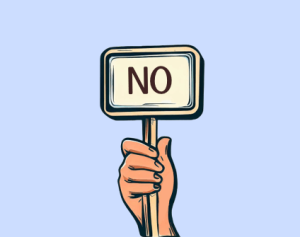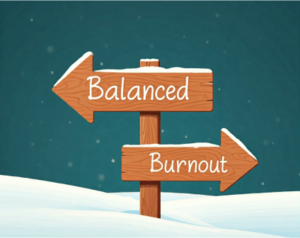Overwhelmed by an avalanche of commitments? Join the club. In our hyper-connected society, it’s tempting to think that agreeing to everything is the key to getting ahead. But here’s a revolutionary concept: what if strategically saying “no” could boost your success? Let’s explore how mastering the art of the “healthy no” can increase your productivity and well-being.
The “Healthy No”: Your New Superpower
Saying no isn’t about being difficult or antisocial. It’s about making intentional choices that align with your goals and values. Dr. Angela Duckworth, Professor of Psychology at the University of Pennsylvania, puts it perfectly:
“In the early stages of your career, it’s easy to feel pressure to say yes to everything. But your time and energy are finite resources. Learning to say no to protect those resources allows you to strategically invest in the work that will have the biggest impact on your long-term goals.”
Think of “no” as your gatekeeper, guarding your time and energy for what truly counts.

Why Saying No is Essential for Success:
1. Time Reclaimed
Every “no” to a non-essential task is essentially a “yes” to something that matters more. By declining less important commitments, you free up valuable time for activities that align with your core goals and values. This reclaimed time can be invested in personal growth, strategic projects, or even much-needed rest. Remember, time is our most precious and non-renewable resource – use it wisely.
2. Stress Reduced:
Fewer commitments translate to less overwhelm and more peace of mind. When you’re not constantly juggling multiple tasks or racing from one obligation to another, you create mental space for clarity and focus. This stress reduction can lead to improved mental health, better sleep, and enhanced overall well-being. It’s about creating a sustainable pace for your life and work.
3. Quality Over Quantity:
By focusing on fewer tasks, you can dedicate more energy and attention to each, resulting in exceptional outcomes. This approach allows you to dive deeper, be more creative, and produce work of higher quality. It’s the difference between being a jack-of-all-trades and a master of your chosen priorities.
4. Improved Decision-Making:
When you’re not overwhelmed by commitments, you have more mental bandwidth for thoughtful decision-making. Saying no to less important matters gives you the clarity to see opportunities more clearly and make choices that truly benefit your long-term goals. It’s about being proactive rather than reactive in shaping your life and career.
5. Enhanced Reputation:
Contrary to what you might think, saying no can boost your professional reputation. When you’re selective about your commitments, you become known for delivering high-quality work consistently. People learn to respect your time and value your contributions more. Plus, when you do say yes, it carries more weight because it’s not your default response.
Let’s be honest – saying no isn’t always a walk in the park. Many of us fall into the “yes” trap, thinking that agreeing to everything will fast-track our careers or make us more likable. However, this often leads to stress, burnout, and mediocre performance. The key is to recognize that guilt and fear often accompany the act of saying no, but these emotions are usually more in our heads than in reality.
Setting clear boundaries and being selective with commitments often earns respect from colleagues and superiors. It can even inspire others to be more mindful of their own time and energy allocation. Learning to say no isn’t about being difficult – it’s about creating space for opportunities that truly align with your goals and values.

Practical Tips for Mastering the “Healthy No”
1. The Sandwich Technique:
Cushion your “no” between two positive statements. For instance, you might say, “I appreciate you thinking of me for this project. Unfortunately, I can’t take it on right now, but I’d love to collaborate in the future when my schedule frees up.” This approach softens the refusal, shows appreciation, and keeps the door open for future opportunities.
2. Offer an Alternative:
When you can’t fulfill a request as presented, suggest something you can do. For example, “While I can’t attend the full-day workshop, I’d be happy to review the materials and provide detailed feedback.” This demonstrates your willingness to help within your constraints and shows initiative.
3. The Delayed No:
If you’re unsure, it’s okay to buy time. Respond with something like, “Let me check my schedule and get back to you by Friday.” This gives you space to consider the request carefully without the pressure of an immediate response, allowing for a more thoughtful decision.
4. Practice Self-Compassion:
Saying no doesn’t make you a bad person; it makes you someone who respects your boundaries. Remind yourself that by declining, you’re honoring your existing commitments and maintaining a healthy balance, which ultimately benefits both you and those you work with.
Start small. Maybe it’s declining that extra project at work or saying no to a social event you’re not excited about. Pay attention to how it feels and the results it brings. Saying no isn’t about closing doors; it’s about opening the right ones. It’s about creating space in your life for growth, creativity, and the things that truly light you up.
So, the next time you’re faced with a request that doesn’t align with your priorities, take a deep breath and consider the power of a “healthy no”.




